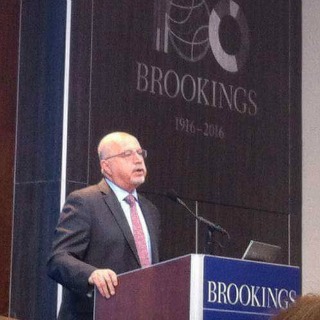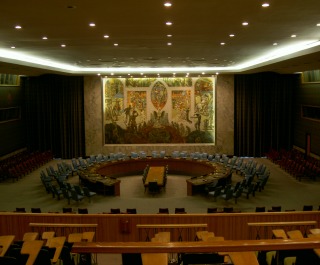The fourth in a series of security validators for APN is Gen. Colin Powell, American statesman and retired four-star general in the United States Army, 65th United States Secretary of State, former National Security Advisor (1987–1989), former Commander of the U.S. Army Forces Command (1989) and former Chairman of the Joint Chiefs of Staff (1989–1993).
 On Monday, July 11 2016, the Brookings Institute published the results of the most recent surveys
on American attitudes toward the Middle East, conducted by Shibley Telhami, Nonresident Senior Fellow. The
newest poll was conducted within two weeks of the shootings in Orlando, focusing on American attitudes toward
Muslims and Islam. These results were compared to those of similar polls carried out in November 2015 and May
2016 to see whether there has been a shift in public opinion since two important landmarks: The most vital
months of the presidential election campaigns, and the Orlando massacre.
On Monday, July 11 2016, the Brookings Institute published the results of the most recent surveys
on American attitudes toward the Middle East, conducted by Shibley Telhami, Nonresident Senior Fellow. The
newest poll was conducted within two weeks of the shootings in Orlando, focusing on American attitudes toward
Muslims and Islam. These results were compared to those of similar polls carried out in November 2015 and May
2016 to see whether there has been a shift in public opinion since two important landmarks: The most vital
months of the presidential election campaigns, and the Orlando massacre.
Telhami noted that the results of the most recent polls were unexpected: despite the extremely inflammatory anti-Muslim rhetoric of the presidential campaigns, as well as the fact that the Orlando shootings were carried out by a radicalized Muslim, more people tended to be favorable toward both the Muslim religion and the Muslim people in the May and June 2016 polls. In November 2015, 53% of those questioned responded that they held a favorable attitude toward the Muslim people. That percentage increased to 58% in May 2016 (pre-Orlando) and then to 62% in June 2016 (post-Orlando). This trend also repeated itself with regards to attitudes toward the Muslim religion: 37% were favorable toward the Muslim religion in November 2015, 42% in May 2016 and 44% in June 2016. It was also encouraging to see that the proportion of Americans who identify with the position that Islamic and Western religious and social traditions are incompatible with each other has decreased from 39% in November 2015 to 34% in June 2016.
Last night, Netanyahu’s right wing government
pushed a law through the Knesset to silence dissent. Although it was touted to the public as a matter of
transparency, the reality is that this law is aimed at Peace Now and other progressive groups.
Never mind that all non-profit organizations receiving funding from foreign governments must already disclose all such funding. Never mind that NGOs on the left, which are already transparent about their donors, are publicly branded, in effect, as agents of foreign governments. Never mind that right-wing groups – whose agendas align comfortably with that of the current Israeli government and who receive millions of dollars in donations from foreign individuals and entities – are able to keep their donors secret.
Israel’s Peace Now Movement to Challenge New NGO Law before Israel’s Supreme Court
Washington, DC -- Americans for Peace Now (APN) joins its Israeli sister organization, Peace Now (Shalom Achshav) in strongly condemning the new NGO Law, adopted last night by the Knesset, as a blatant violation of freedom of expression. APN supports Peace Now’s intention to challenge the new law before Israel’s Supreme Court.
As Peace Now points out, this law is tailored specifically to target only peace and human rights organizations. It intends to divert the Israeli public discourse away from the occupation, and to silence opposition to the government's policies.
News from Peace Now's (Israel) Settlement Watch:
On July 6, 2016 the High Planning Committee of the Civil Administration convened in order to discuss and approve
construction plans in the settlements. The committee discussed the approval of 531 housing units in Ma'ale Adumim
and the plan to retroactively legalize the illegal outpost of Horesh Yaron, which is located west of Ramallah.
Since the beginning of 2016 construction plans for 1,823 housing units in the settlements were promoted. out of the
1,823, 314 are retroactive plans for housing units which were built illegally. It is important to note that the
Quartet Report's criticism on Israel's settlement policy focused specifically on retroactive legalization of
illegal outposts and illegal construction.
Additionally, yesterday, July 10 2016, the government approved a transfer approximately 50 Million Shekels to
Kiryat Arba and Hebron.
Peace Now: The promotion of plans in Ma'ale Adumim and the retroactive legalization of an
illegal outpost are a slap in the face of the Quartet. Netanyahu is signaling to Israel's most important allies
that he is not interested in peace and two states but rather in the continuation of the occupation.
Yossi Alpher is an independent security analyst. He is the former director of the Jaffee Center for Strategic Studies at Tel Aviv University, a former senior official with the Mossad, and a former IDF intelligence officer. Views and positions expressed here are those of the writer, and do not necessarily represent APN's views and policy positions.
This week, Alpher discusses what’s behind the flurry of diplomatic and strategic activity, including Israel’s rapprochement with Turkey, Netanyahu's meeting in East Africa with seven regional leaders, and the Egyptian foreign minister visiting Israel for the first time in nine years; the strategic backdrop in East Africa; Egyptian Foreign Minister Sameh Shukry's presumed discussion with Netanyahu about Israeli-Turkish relations; Shukry and Netanyahu's statements Sunday concerning the need to renew some sort of Israeli-Palestinian peace or at least confidence-building process; whether the right-wing Netanyahu government with its strong pro-settler element really has anything to talk about with the Arabs concerning the Palestinian issue; and what’s next regarding establishing Israeli spheres of strategic influence in the region and beyond, and what might this signify for the Palestinian issue.

Update: this action, now closed, ran in July 2016.
Last Wednesday, the Israeli government announced plans for hundreds of new homes in Israeli settlements in the West Bank and East Jerusalem. In response, the U.S. Department of State issued a sharply-worded statement pointing out how destructive these new settlement plans are.
State Department Spokesperson John Kirby said, "…this report would be the latest step in what seems to be a systematic process of land seizures, settlement expansions and legalizations of outposts that is fundamentally undermining the prospects for a two-state solution…”
He went on to state, unequivocally: “We oppose steps like these, which we believe are counterproductive to the cause of peace. In general, we’re deeply concerned about settlement construction and expansion in East Jerusalem and the West Bank.”
As an organization dedicated to peace and security for Israel – and committed to the belief that Israel has a right to exist and that its legitimacy as a state is beyond question – APN has wrestled with the challenge posed by the Boycott, Divestment, and Sanctions movement (BDS). We have studied both the BDS movement and the efforts to combat it. We have listened closely to arguments and narratives of BDS proponents and detractors. And while APN firmly opposes BDS targeting Israel, we have concluded that many anti-BDS efforts are misguided and counter-productive.
News from Peace Now's (Israel) Settlement Watch:
APN's Lara Friedman at NetRoots Nation: What Does it Mean to be Progressive on Israel and Palestine?

 APN's Lara Friedman, director of policy and government relations for Americans for Peace Now,
joined a panel with Joseph Berman, Heather
Hurlburt, and Yousef Munayyer, and moderated by Mitchell Plitnick on Saturday July 16th, at
9am, to have a constructive conversation on what it means to be progressive on Israel and Palestine
APN's Lara Friedman, director of policy and government relations for Americans for Peace Now,
joined a panel with Joseph Berman, Heather
Hurlburt, and Yousef Munayyer, and moderated by Mitchell Plitnick on Saturday July 16th, at
9am, to have a constructive conversation on what it means to be progressive on Israel and Palestine
In the Spring of 2015, Israeli Prime Minister Benjamin Netanyahu revealed himself as a partisan Republican in a way that he hadn’t publicly before. This created the space for “mainstream” progressivism regarding the Israeli/Palestinian conflict. Put another way, it became more comfortable to identify as an American whose progressive values apply to United States politics as well as the situation in the Middle East. But what does that mean? From Israeli settlement expansion to the BDS movement to the peace process to human rights, the progressive space has paved several paths toward the common goal of peace.
